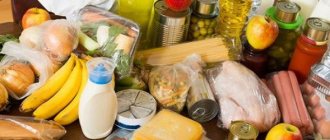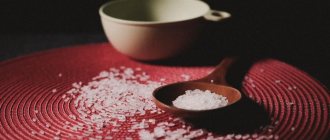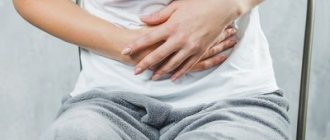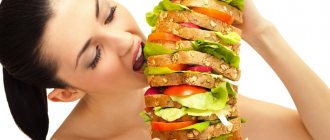Food poisoning is an unpleasant health problem for humans, from which no one is 100 percent immune. Vegetables, berries or fruits treated with chemicals to combat insects can provoke intoxication. In addition, products can be contaminated with harmful microbes and, when consumed, become a cause of intoxication and intestinal infection. Separately, it is worth mentioning mushroom poisoning. A child can become poisoned while exploring the world. Curious children taste everything that interests them: beautiful berries, flowers, liquids in attractive bright packaging, colored medicinal capsules.
Doctors consider alcohol poisoning to be the second most common cause of poisoning in adults.
Since poisoning is not uncommon in our lives, many questions often arise about this. How to deal with intoxication? What to eat after poisoning? We will answer these and other questions below, but now let’s figure out “where legs grow from.”
Causes of food poisoning
Poisoning can be due to various reasons. There are toxic infections and toxic poisonings.
Foodborne toxic infection occurs as a result of pathogenic microorganisms entering the gastrointestinal tract (GIT) with food. As a rule, the causative agent is pathogenic bacteria that multiply in products if they are improperly stored or get into ready-made food if it is not properly processed.
Toxic poisoning can be caused by various poisons - chemicals or natural toxins found in poisonous berries, mushrooms and many other foods.
The greatest danger from the point of view of food poisoning is represented by perishable foods: fish, meat, milk, salads, etc. Also, eggs, home-canned food, fruits and vegetables with a high content of nitrates, poisonous mushrooms and berries, raw beans, sprouted green potatoes and insufficiently washed raw vegetables and fruits can lead to food poisoning.
It is not recommended to consume products that have expired, are in swollen jars, are in damaged original packaging, or have an unusual appearance, smell, consistency and color.
What causes poisoning?
The main cause of poisoning is considered to be food products containing poisons and toxins.
Causes of poisoning:
- Consumption of mushrooms collected in contaminated places (near rubbish heaps, hazardous enterprises, roads).
- Increasing the dosage of medicinal herbs (St. John's wort, wormwood, licorice, bearberry, yarrow) that are toxic. The dosage is prescribed by the doctor.
- Ingestion of poisons, chemicals, alkaline compounds, including mercury, through the oral cavity or respiratory tract.
- Taking alcoholic beverages and drugs.
- Overdose of medications: keeping the first aid kit in a place accessible to children, failure to comply with the daily norm.
- Domestic carbon monoxide poisoning.
Poisoning is caused not only by food, but also by medicines, carbon monoxide, household chemicals, vodka and other alcoholic drinks.
Signs of food poisoning
Symptoms of poisoning are largely similar, regardless of the cause. They are distinguished by intensity and severity depending on the type of toxic substance, age (poisoning in an adult is easier than in children and the elderly) and the amount eaten. However, signs of an inflammatory process in the walls of the intestines and stomach, as well as manifestations of general intoxication of the body, almost always occur.
Signs of poisoning:
- chills, diarrhea, nausea with vomiting;
- feeling unwell, malaise, weakness;
- bloating, painful cramping sensations;
- rise in temperature (usually small).
Severe poisoning, for example, with botulinum toxin, is accompanied by symptoms of damage to the nervous system:
- dry mouth and difficulty swallowing;
- muscle weakness;
- blurred vision, double vision;
- loss of coordination of movements.
Consequences and prevention
Serious consequences from an overdose of toxic substances include disruption of the functioning of the excretory organs, heart and blood vessels, gastrointestinal tract and central nervous system. The formation of negative factors can be prevented if preventive measures are followed.
Prevention of intoxication:
- Check and monitor the expiration date of food products.
- When purchasing products with a short expiration date, be sure to check the integrity of the packaging.
- Before introducing raw vegetables and fruits into the diet, rinse thoroughly and pour additional boiling water over them.
- Follow the rules for storing food and the principles of product placement in the refrigerator.
- Keep hands, kitchen utensils and area clean.
The presence of cockroaches, small rodents, and insects increases the risk of bacteria and microbes. If they are present, it is necessary to urgently disinfect the premises.
First aid for poisoning
For severe poisoning, or poisoning that occurs after eating mushrooms or canned food, you need to call an ambulance.
Symptoms that require medical attention:
- very high temperature;
- frequent diarrhea, watery stools, blood;
- signs of botulism and poisoning from poisonous mushrooms - impaired vision and coordination, difficulty swallowing, hallucinations, delirium and muscle weakness;
- a small child, a pregnant woman or an elderly person was injured.
What to do in case of poisoning:
- Gastric lavage. Give the patient water or a solution of soda, salt, potassium permanganate, and then induce vomiting. You should drink no more than half a liter of liquid at a time. Washing should be continued until there are no impurities in the vomit. Typically this requires approximately five liters of liquid;
- Taking enterosorbent - a drug that binds and removes toxins. This can be activated carbon, polysorb, filtrum or enterosgel;
- Eliminate dehydration and restore electrolyte balance. To achieve this goal, you need to drink plenty of fluids (weak tea and water at room temperature) and use special solutions (rehydron and glucosolan).
In most cases, relief occurs on the second day, and all signs disappear within three to five days. Otherwise, a therapist or gastroenterologist will be able to figure out the problem.
Diet after poisoning
What can you eat and drink during and after poisoning? You should not eat food on the first day. It is necessary to drink water and special saline solutions frequently. At the first signs of poisoning, it is recommended to take natural sorbents, such as Filtrum. The filter helps remove pathogenic bacteria and bacterial toxins from the body.
Filtrum is a quick remedy for the treatment of diarrhea of any etiology (infectious diarrhea - loperamide is contraindicated, parasitic or rotavirus infection - antibiotics are useless, activated carbon is ineffective)
What can you eat next?
Summary table of nutrition after poisoning
| 1 day | Day 2 | Day 3 | 4 day | 5 day |
| you can't eat anything | vegetable broth | vegetable broth | chicken bouillon | chicken bouillon |
| vegetable puree | vegetable puree | vegetable casserole | vegetable casserole | |
| crackers | crackers | fish | rice porrige | |
| rice porrige | crackers | crackers | ||
| rice porrige | boiled fish |
On the second day it is recommended:
- 200 ml vegetable broth;
- 2-3 crackers;
- 100 ml liquid vegetable puree.
The amount of liquid is up to 2 liters. You can drink boiled water, rosehip decoction, alkaline mineral waters without gas, saline pharmaceutical solutions.
On the third day, you can introduce cereals into your diet.
Proper volume of products:
- 200 ml vegetable broth;
- 300 g of rice porridge, liquid and boiled in water;
- crackers (up to 4 pcs.) and biscuits (2-3 pcs.).
Starting from the fourth day, the volume and list of products expands, it is possible to add chicken broth and lean fish (pike perch).
Daily ration:
- 200 g vegetable casserole with semolina (without eggs),
- 100-150 ml of chicken broth (bring to a boil for the first time and drain the broth, pour water over the chicken again and prepare the dish);
- 100 g boiled fish;
- crackers (4-5 pcs.) and biscuits (5-6 pcs.);
When preparing fish and chicken broth, do not add vegetables or spices, just add a little salt.
On the fifth day, it is necessary to continue expanding the diet. Recommended dishes include chicken, rice, and cottage cheese:
- 300-400 ml chicken broth with chicken meatballs;
- 200-300 g boiled rice;
- 200-300 g casserole or cottage cheese soufflé (without eggs);
- crackers up to 5-6 pcs.
What can you eat on the first day?
On the first day, the list of what you can eat after poisoning is very limited. On the first day, it is necessary to combat dehydration and loss of electrolytes, protect the stomach walls from toxins and hydrochloric acid.
You need to drink alkaline non-carbonated drinks. This can be weak sweet black tea, sweet compote, mineral water, chamomile or St. John's wort decoction. It is better to avoid acidic drinks; they can increase intoxication and inflammation of the stomach. You should drink 1 glass of liquid every hour.
On the first day of food poisoning, you can eat:
- Dried white bread. It is best to dry it at home. Store-bought salted crackers are contraindicated.
- Boiled rice porridge without salt and oil. When preparing it, you need to add twice as much water as usual (for one glass of rice - 4 glasses of water).
- Galette cookies. Only the simplest cookies will do, without additives or fillings.
- Bananas. Choose ripe, unspoiled fruits. You can eat half a banana at one time, you can grind it in a blender and mix it with rice porridge.
- Boiled oatmeal, slimy consistency. It envelops the stomach and relieves irritation.
Causes and symptoms
The main cause of food poisoning is the use of foods containing toxic ingredients. It is necessary to include seafood and exotic fruits in the menu with caution. Before purchasing, you need to check the expiration date of the selected product.
Poisoning can be caused by:
- mayonnaise dressings,
- stale dairy products,
- rotten eggs;
- old cream cakes;
- excess alcohol;
- drug overdose;
- chemicals.
If pathogenic microbes, toxic elements or chemicals do enter the body, then it is necessary to study the symptoms of the problem in order to quickly identify it and provide first aid to the victim.
Main symptoms of poisoning:
- general weakness;
- nausea, turning into repeated vomiting;
- heat;
- upset stomach, bloating;
- headaches and dizziness.
Such a reaction to acute intestinal poisoning can occur 30 to 40 minutes after toxic substances enter the body. Moderate intoxication appears within a few hours, or maybe a day, after poisoning. Symptoms persist for several days and, with proper treatment, gradually disappear.
Medicines
All drugs for restoring intestinal microflora after poisoning can be divided into two groups.
- Probiotics are medications containing one or more live cultures of bacteria. Once in the intestines, they populate the mucous membrane and replenish the ranks of beneficial microbes. Under favorable conditions, bacteria take root and begin to multiply intensively.
- Prebiotics are products that do not contain live bacteria, but include chemicals that are “food” for beneficial microbes or create conditions for their growth, as well as suppress pathogenic microflora.
Probiotics
Medicines from the probiotic group may contain one or more cultures. Such products are available in the form of tablets, capsules and rectal suppositories.
Here is a list of some drugs that can be used to restore the intestines after poisoning.
- “Lactobacterin”, “Acilact”, “Biobakton” - they contain a monoculture of lactobacilli.
- “Bifidumbacterin”, “Probifor” - they contain a monoculture of bifidobacteria.
Single medications are incompatible with taking antibiotics, will not help with complex dysbacteriosis, and they have age restrictions.
Probiotics, including several bacterial cultures:
- "Florin Forte" - contains bifidobacteria and lactobacilli. Can be used by children. The drug must be stored in the refrigerator.
- "Linex". Includes three types of bacteria (lacto- and bifidobacteria, enterococci). It can be combined with taking antibiotics, there are no age restrictions, suitable for nursing and pregnant women.
- "Bifikol" - contains bifidobacteria and E. coli.
Another group of probiotics are microbes that are not normal representatives of the intestinal biocenosis. They form spore forms, therefore they are extremely resistant to the aggressive environment of the stomach. Once in the intestines, bacteria quickly multiply and suppress the growth of pathogenic microbes. They live in the body for about a month, then are gradually eliminated, giving way to normal microflora. This class includes the drugs “Baktisubtil” (Bacillus cereus) and “Sporobacterin”. They are successfully used to treat diarrhea.
Probiotics have their limitations. They are prescribed with caution to people with impaired immunity and patients prone to allergic reactions.
Methods for restoring microflora
Often the microflora suffers from the uncontrolled use of antibiotics during treatment. Against the backdrop of the fight against pathogenic microorganisms, obligate flora also suffers. In conditions of complete sterility of the intestines, dangerous bacteria begin to multiply at a rapid pace.
To restore the balance of intestinal bacteria, you need to stick to a special diet for some time and start taking probiotics. A person’s diet after poisoning should include food rich in lactic acid and bifidobacteria. Will be useful:
- dairy products;
- sauerkraut;
- barrel cucumbers;
- soaked apples;
- bread kvass
For dysbacteriosis with diarrhea, it is recommended to drink decoctions of viburnum, rose hips, motherwort, chamomile and yarrow. A decoction of elderberry, mint, tansy, flax seeds and fennel is considered an effective remedy for constipation.
Get rid of intestinal problems
The natural British drug is not addictive and works immediately
Find Fitomucil with benefits
Fiber to restore bowel function
Fiber is considered one of the most useful remedies for intestinal disorders. They improve intestinal motility, remove toxins and carcinogens, and reduce fat absorption. Dietary fiber is a valuable component necessary for the growth of beneficial bacteria. This is why in case of dysbiosis it is so often recommended to eat foods rich in plant fiber.
Fitomucil Norm contains natural fiber. It included:
- homemade plum fruits;
- the shell of a special variety of plantain seeds.
The powder can be mixed with water, juice or yogurt. When fiber enters the intestines, it creates favorable conditions for the growth of natural microflora. Pectin contained in plum enhances the effect. A balanced composition will help to quickly get rid of constipation and dysbiosis after poisoning.
Possible causes of vomiting in children
After vomiting, the main thing is to drink!
If the child’s condition does not cause concern, and the vomiting was not gushing, but one-time and not very strong, you can try to stabilize his condition on your own. Possible causes of childhood vomiting may include:
- Head injury. This life-threatening condition may be accompanied by fainting.
- Brain concussion.
- Food poisoning. Accompanied by high fever and diarrhea.
- Bacterial infection of the stomach and intestines.
- Increased temperature with acute respiratory infections, acute respiratory viral infections.
- Disorders of the gastrointestinal tract (gastritis, peptic ulcer of the duodenum and stomach). Vomit may be streaked with blood. Additionally, abdominal pain appears.
- Pylorospasm in newborns.
- Unusual food, excessive consumption of spices and food additives, sweets.
- Eruption of baby teeth.
It is imperative to find out the cause of vomiting in order to avoid complications. Particular attention is given to infants and newborns and children with chronic diseases. Symptoms such as vomiting with bile and blood, rapid pulse, pale skin, a combination of vomiting and diarrhea, constant drowsiness or excessive overexcitation, breast refusal and severe crying in an infant make one fear serious consequences. In these cases, you should immediately seek emergency medical help.
Diet for the first week
In case of food poisoning, a gentle diet should be followed for 1 week. On the third day, and in the next 4 days, you can expand your menu with the following dishes:
- Fermented milk products. You can eat low-fat cottage cheese, drink fermented baked milk, kefir, yogurt. These products will restore the intestinal microflora and improve its functioning.
- Boiled or baked fish. It is best to choose low-fat varieties of sea fish.
- Low-fat chicken broth. This dish will help restore lost microelements and fatty acids.
- Baked and boiled vegetables. You can prepare them in the form of a dietary vinaigrette (without mayonnaise and beans).
- Buckwheat, millet porridge, pasta.
If it’s difficult for you to live without coffee, you can drink it already on day 3, but only with milk. It is best to drink coffee after meals, so that it does not irritate the gastric mucosa.
The table below shows an example of a menu that you can follow during the first week after poisoning (with the exception of 1.2 days):
| Name of meal | Grocery list |
| Breakfast |
|
| Afternoon snack |
|
| Dinner |
|
| Snack |
|
| Dinner |
|










